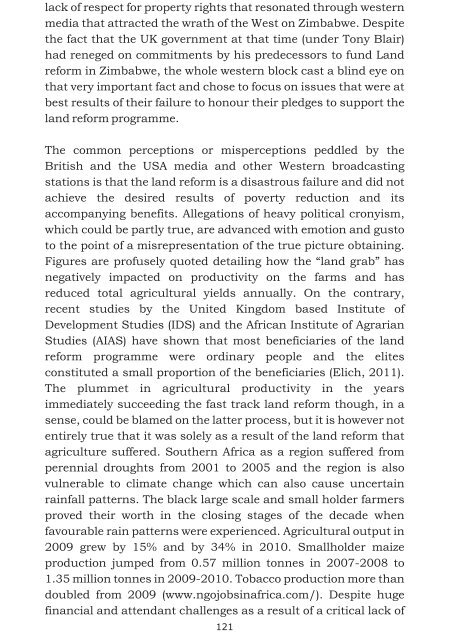Beneficiaries are actors too.pdf - Southern Institute of Peace ...
Beneficiaries are actors too.pdf - Southern Institute of Peace ...
Beneficiaries are actors too.pdf - Southern Institute of Peace ...
You also want an ePaper? Increase the reach of your titles
YUMPU automatically turns print PDFs into web optimized ePapers that Google loves.
lack <strong>of</strong> respect for property rights that resonated through western<br />
media that attracted the wrath <strong>of</strong> the West on Zimbabwe. Despite<br />
the fact that the UK government at that time (under Tony Blair)<br />
had reneged on commitments by his predecessors to fund Land<br />
reform in Zimbabwe, the whole western block cast a blind eye on<br />
that very important fact and chose to focus on issues that were at<br />
best results <strong>of</strong> their failure to honour their pledges to support the<br />
land reform programme.<br />
The common perceptions or misperceptions peddled by the<br />
British and the USA media and other Western broadcasting<br />
stations is that the land reform is a disastrous failure and did not<br />
achieve the desired results <strong>of</strong> poverty reduction and its<br />
accompanying benefits. Allegations <strong>of</strong> heavy political cronyism,<br />
which could be partly true, <strong>are</strong> advanced with emotion and gusto<br />
to the point <strong>of</strong> a misrepresentation <strong>of</strong> the true picture obtaining.<br />
Figures <strong>are</strong> pr<strong>of</strong>usely quoted detailing how the “land grab” has<br />
negatively impacted on productivity on the farms and has<br />
reduced total agricultural yields annually. On the contrary,<br />
recent studies by the United Kingdom based <strong>Institute</strong> <strong>of</strong><br />
Development Studies (IDS) and the African <strong>Institute</strong> <strong>of</strong> Agrarian<br />
Studies (AIAS) have shown that most beneficiaries <strong>of</strong> the land<br />
reform programme were ordinary people and the elites<br />
constituted a small proportion <strong>of</strong> the beneficiaries (Elich, 2011).<br />
The plummet in agricultural productivity in the years<br />
immediately succeeding the fast track land reform though, in a<br />
sense, could be blamed on the latter process, but it is however not<br />
entirely true that it was solely as a result <strong>of</strong> the land reform that<br />
agriculture suffered. <strong>Southern</strong> Africa as a region suffered from<br />
perennial droughts from 2001 to 2005 and the region is also<br />
vulnerable to climate change which can also cause uncertain<br />
rainfall patterns. The black large scale and small holder farmers<br />
proved their worth in the closing stages <strong>of</strong> the decade when<br />
favourable rain patterns were experienced. Agricultural output in<br />
2009 grew by 15% and by 34% in 2010. Smallholder maize<br />
production jumped from 0.57 million tonnes in 2007-2008 to<br />
1.35 million tonnes in 2009-2010. Tobacco production more than<br />
doubled from 2009 (www.ngojobsinafrica.com/). Despite huge<br />
financial and attendant challenges as a result <strong>of</strong> a critical lack <strong>of</strong><br />
121


